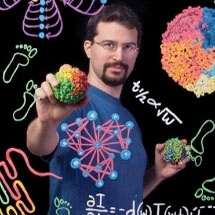News
Erez Lieberman Aiden, Renaissance man. Photo courtesy of the Lemelson-MIT Program.
Erez Lieberman Aiden is a talkative witty fellow, who will bend your ear on any number of intellectual topics. Just don’t ask him what he does. “This is actually the most difficult question that I run into on a regular basis,” he says. “I really don’t have anything for that.”
It is easy to understand why. Aiden is a scientist, yes, but while most of his peers stay within a specific field – say, neuroscience or genetics – Aiden crosses them with almost casual abandon. His research has taken him across molecular biology, linguistics, physics,engineering and mathematics. He was the man behind last year’s "culturomics" study, where he looked at the evolution of human culture through the lens of four per cent of all the books ever published. Before that, he solved the three-dimensional structure of the human genome, studied the mathematics of verbs, and invented an insole called the iShoe that can diagnose balance problems in elderly people. “I guess I just view myself as a scientist,” he says.
His approach stands in stark contrast to the standard scientific career: find an area of interest and become increasingly knowledgeable about it. Instead of branching out from a central speciality, Aiden is interested in 'interdisciplinary' problems that cross the boundaries of different disciplines. His approach is nomadic. He moves about, searching for ideas that will pique his curiosity, extend his horizons, and hopefully make a big impact. “I don’t view myself as a practitioner of a particular skill or method,”he tells me. “I’m constantly looking at what’s the most interesting problem that I could possibly work on. I really try to figure out what sort of scientist I need to be in order to solve the problem I’m interested in solving.”
Cutting-edge science delivered direct to your inbox.
Join the Harvard SEAS mailing list.
